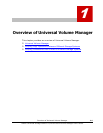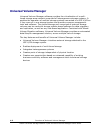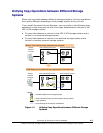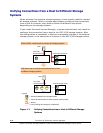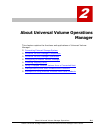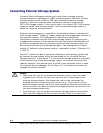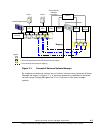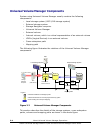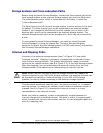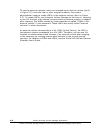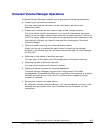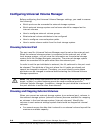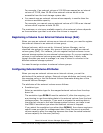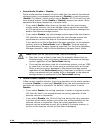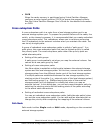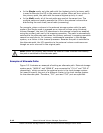
About Universal Volume Manager Operations 2-5
Hitachi Universal Storage Platform V/VM Universal Volume Manager User’s Guide
Storage Systems and Cross-subsystem Paths
Before using Universal Volume Manager, connect the fibre channel port of the
local storage system to the external storage system port with the fibre cable.
The route between ports, which is connected with the cable, is called the
"cross-subsystem path".
The fibre channel port of the local storage system is set to connect to the host
by default. The fibre channel port can be connected to an external storage
system if you change the attribute of the fibre channel port so that it is an
external port, which can be connected to an external storage system. The
external storage system port can be a target port, which can be connected to
a host.
To manipulate Universal Volume Manager, you need to install Universal
Volume Manager by using the license key. Use your Storage Navigator
computer to access the local storage system via SVP (web server) and perform
the Universal Volume Manager operations.
Volumes and Mapping Paths
Volumes in the external storage system (see C in Figure 2-2) are called
"external volumes". Mapping is necessary to manipulate an external volume
from the local storage system. The system administrator maps an external
volume as an internal volume (see B in
Figure 2-2) in the local storage system.
After the mapping, you can manipulate the external volume from the local
storage system in the same way as manipulating an internal volume.
Note: When external volumes in external storage systems are mapped as
internal volumes in your USP V/VM storage systems, the external volumes can
be accessed and copied by hosts connecting to your USP V/VM storage
systems, but not by hosts connecting to the external storage systems.
This document sometimes uses the term "an external volume" or "a mapped
external volume" to mention an internal volume where an external volume is
mapped (see B in
Figure 2-2), because this internal volume is a virtual
representation of an external volume.
When you perform mapping, a path is automatically created between an
internal volume and an external volume. This path is called "a mapping path",
which connects one volume with another volume. A cross-subsystem path is a
part of a mapping path.



